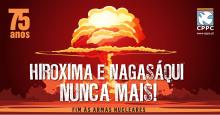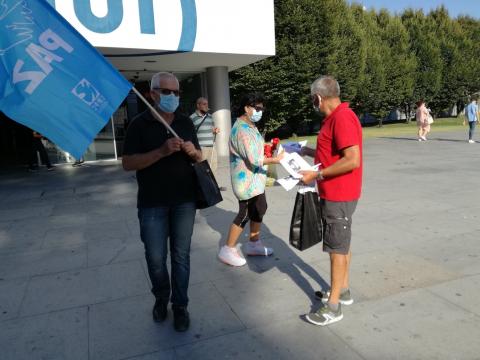75 years of the Hiroshima and Nagasaki bombings | For the end of nuclear weapons
The Portuguese Council for Peace and Cooperation (CPPC) marks the 75th. anniversary of the atomic bombings of Hiroshima and Nagasaki and reaffirms the need and urgency to end nuclear weapons, calling for the signing and ratification of the Nuclear Weapons Ban Treaty.
The horrors of World War II remain in the memory of the peoples of the world, including the holocaust perpetrated by the German Nazis and the American nuclear bombings of the Japanese cities of Hiroshima and Nagasaki - which took place on the 6th. and 9th. August 1945 - on a Japan in practice already defeated and on cities without any strategic military importance, making this crime even more brutal.
The dimension of this crime is also expressed in the number of victims and in the monstrosity of its effects: more than 100 thousand killed at the time of the explosions and many others by the end of 1945, because of the injuries; among the survivors and their descendants, the occurrence of malformations and cancerous diseases skyrocketed due to radiation.
Following the horror of World War II and the barbaric atomic bombings, the end of nuclear weapons and a general, simultaneous and controlled disarmament has been a central goal of action for more than seven decades for all those in Portugal and in the world who defend international peace and security. Remembering Hiroshima and Nagasaki is, above all, a wake-up call to the risks that exist today: due to the size and power of the current nuclear arsenals, a nuclear war would not be limited to replicating the consequences of Hiroshima and Nagasaki, but would expand them on a scale never before seen.
According to the Federation of American Scientists, there are about 15,000 nuclear warheads in the world (1800 in a state of "high alert"), of which 14,000 are in the possession of the USA and Russia. The rest are in the hands of the United Kingdom (215), France (300), China (270), India (110-120), Pakistan (120-130), Israel (80) and the Democratic People's Republic of Korea (fewer than 10).
So far, only the USA has used this type of weapons, currently maintaining nuclear weapons scattered all over the world, in military bases and naval squadrons. The United States spends more on its arsenals than the remaining eight countries combined and admits the possibility of a preventive nuclear attack, even against countries that do not have nuclear weapons. If only a small part of the existing nuclear bombs were used all life on Earth would be seriously threatened.
The CPPC reaffirms the need for stronger action to defend peace and disarmament, which becomes even more important in times as uncertain and dangerous as the one we live in, namely when the US promotes the arms race, including nuclear, with the largest military budget ever, with serious steps, such as its withdrawal from the Intermediate-Range Nuclear Forces Treaty and other recent US Administration/Donald Trump statements, calling into question the 2021 renewal of the Strategic Arms Reduction Treaty (New START).
The CPPC reaffirms that Portugal must sign, ratify and promote the Nuclear Weapons Ban Treaty, approved three years ago by the UN, actively contributing for a world free of nuclear weapons and of peace, and calls on all lovers of peace to sign the new Petition to this end.
National Board of CPPC
August 2020
-//-
75 anos dos bombardeamentos de Hiroxima e Nagasáqui | Pelo fim das armas nucleares
O Conselho Português para a Paz e Cooperação (CPPC) assinala os 75 anos dos bombardeamentos atómicos de Hiroxima e Nagasáqui e reafirma a necessidade e urgência de pôr fim às armas nucleares, apelando à assinatura e ratificação do Tratado de Proibição das Armas Nucleares.
Na memória dos povos de todo o mundo permanecem os horrores da Segunda Guerra Mundial, incluindo o holocausto perpetrado pelos nazis alemães e os bombardeamentos nucleares norte-americanos sobre as cidades japonesas de Hiroxima e Nagasáqui – ocorridos a 6 e 9 de Agosto de 1945 - sobre um Japão na prática já derrotado e sobre cidades sem importância militar estratégica, tornando o crime ainda mais brutal.
A dimensão desse crime está também expressa no número de vítimas e na monstruosidade dos seus efeitos: mais de 100 mil mortos no momento das explosões e outros tantos até ao final de 1945, na sequência dos ferimentos; entre os sobreviventes e seus descendentes, disparou a incidência de malformações e doenças oncológicas, devido à radiação.
Na sequência do horror da II Guerra Mundial e dos bárbaros bombardeamentos atómicos, o fim das armas nucleares e o desarmamento geral, simultâneo e controlado é, desde há mais de sete décadas, um objetivo central da ação de todos quantos, em Portugal e no mundo, defendem a paz e a segurança internacionais.
Recordar Hiroxima e Nagasáqui é, acima de tudo, um grito de alerta para os riscos hoje existentes: pela dimensão e potência dos atuais arsenais nucleares, uma guerra nuclear não se limitaria a replicar as consequências de Hiroxima e Nagasáqui, antes as ampliaria a uma escala nunca vista.
Segundo a Federação dos Cientistas Americanos, existem no mundo cerca de 15 mil ogivas nucleares (1800 em estado de «alerta máximo»), das quais 14 mil estão na posse de EUA e Rússia. As restantes estão nas mãos do Reino Unido (215), França (300), China (270), Índia (110-120), Paquistão (120-130), Israel (80) e República Popular Democrática da Coreia (menos de 10).
Até ao momento, só os EUA utilizaram este tipo de armamento, mantendo atualmente armas nucleares espalhadas por todo o mundo, em bases militares e esquadras navais. Os EUA gastam mais nos seus arsenais do que os restantes oito países juntos e admitem a possibilidade de um ataque nuclear preventivo, mesmo contra países que não possuem armas nucleares.
Bastaria que fosse utilizada uma pequena parte das bombas nucleares existentes para que toda a vida na Terra ficasse seriamente ameaçada.
O CPPC reafirma a necessidade de uma mais forte ação em prol da paz e do desarmamento, o que se torna ainda mais importante num tempo tão incerto e perigoso, como aquele em que vivemos, nomeadamente quando os EUA promovem a corrida aos armamentos, incluindo nucleares, com o maior orçamento militar de sempre, com passos graves, como a sua retirada do Tratado de Forças Nucleares de Alcance Intermédio e outras manifestações recentes da Administração dos EUA/Donald Trump, pondo em causa a renovação, em 2021, do Tratado de Redução de Armas Estratégicas (New START).
O CPPC reafirma que Portugal deve assinar, ratificar e promover o Tratado de proibição de Armas Nucleares, aprovado há três anos no âmbito da ONU, contribuindo ativamente para um mundo livre de armas nucleares e para a paz, e apela a todos os amantes da Paz a que assinem a nova Petição com este objetivo.
Direção Nacional do CPPC
Agosto de 2020


